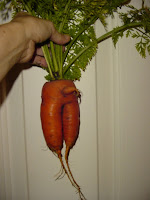I was just thinking about when we started on this chicken raising adventure. The first year, we lost three of the seven little chicks. The chicks were purchased as "just hatched" from a well known farming store closer in to Portland. In talking with the store owner later in the year, I learned that others had a similar die-off experience. That store no longer sells Russian Oroff chicks. That year was an unusually hot spring, that I feel contributed to the issue. But there were other things that I we have learned. For example, we initially placed the chicks into an aquarium and the heat from the lamp radiates off the glass, making the area that much toastier. We would have done better to use the little brooder heating shelf instead of the heat lamp in that environment. After the first year, we lost one of the hens. We think it was kidney failure.
In our second year, we invested in one of the little brooder heaters. We purchased 10 Russian Orloff chicks from a different farm store. in anticipation of losing some, again. But this time, we did not lose a single chick. Additionally, we started them with a fine ground chick feed (non-medicated) and a little pro-biotic in their water. Also, the first week, we did not use any shavings. Instead, we used towels for flooring. We did switch to shavings a week later. After two weeks, we stopped grinding the feed and no longer added the pro-biotic. We ended up selling some of the hens because we just had way too many. We kept seven, thinking that a family member was going to take three off our hands, but life circumstances changed and we kept all seven. We got one of the hens back because she was a he. He is moved to a new location. We live very close to the city and we didn't want to cause any rooster ordinance issues (but we don't live in the city.)
The third year, we picked up five chicks. This time, we picked up Welsummer. We decided to use an old rabbit cage with sheets wrapped around it for a brooder. We used the brooder heater. We basically did the same as last year. We used towels for the flooring and ground their food, but we did not do the pro-biotics. Again, no dead chicks. We gave away two chicks and kept three for ourselves.
Looking back, losing those babies during the first few weeks of caring for them, was a really difficult experience. In fact, even when we lost the year-old hen, it was emotional. We knew that these girls were probably not as healthy from the start. We did not give up. We tried different techniques and approached the situations differently in hopes of giving the chicks a better, healthier start.
One thing we know for certain now, is that, for the most part, these tiny little chicks are resilient, considering all that they go through to get to the farm store! Before buying the chicks, ask friends and neighbors about the store you plan to purchase the chicks from. Also, have a large enough brooder ready to go. Have a large enough coop and pen ready to go. Because let me tell you, these little chicks grow much faster than you can even imagine! Thanks for allowing me to share :)

